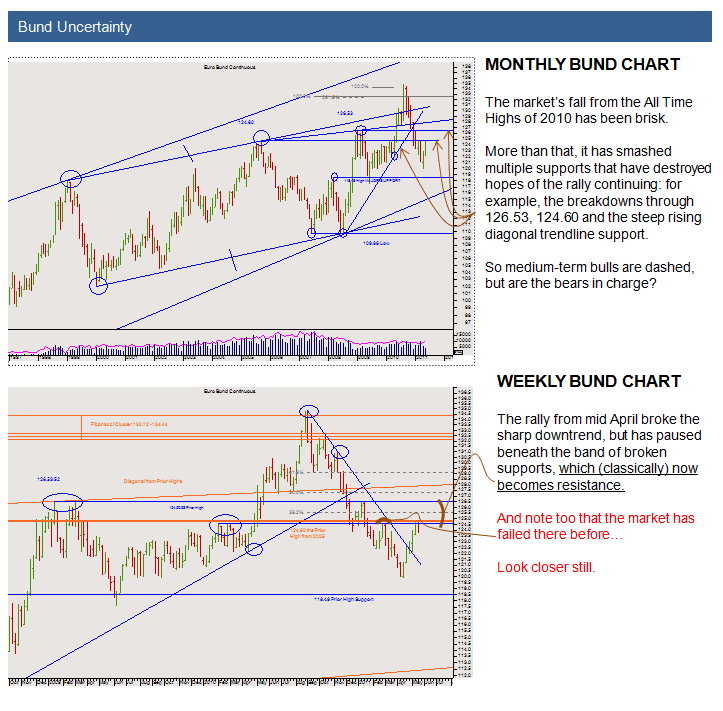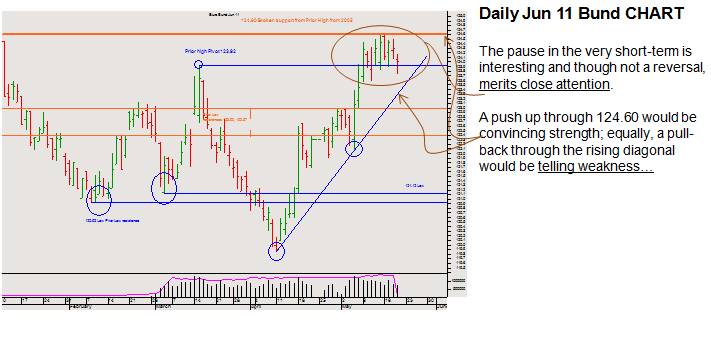German Bund Market Uncertainty
Interest-Rates / International Bond Market May 20, 2011 - 05:12 AM GMTBy: Seven_Days_Ahead
 Over recent weeks Government Bond markets have staged a strong rally, at a time when traders and investors have become increasingly concerned about the Euro zone Sovereign debt crisis and the US budget deficit.
Over recent weeks Government Bond markets have staged a strong rally, at a time when traders and investors have become increasingly concerned about the Euro zone Sovereign debt crisis and the US budget deficit.


FUNDAMENTALS:
Over recent weeks Government Bond markets have staged a strong rally, at a time when traders and investors have become increasingly concerned about the Euro zone Sovereign debt crisis and the US budget deficit.
Given that government bonds are no more than IOU’s, one could be forgiven for expecting US and Euro zone bond markets to sell off on these anxieties. But there have been several factors at work that have driven bond markets higher, which are:
But since the Sovereign debt crisis has been a Euro zone phenomenon, why has the Bund performed so well?
A significant part of the answer is to do with traders fearing that one or more of the peripheral economies in difficulty with debt and receiving financial support, might yet default on their debt.
Although the EU/EZ/IMF rescue fund was set up to prevent such an occurrence, the terms imposed on states taking the help are so draconian that they have retarded economic recovery and in some cases deepened recession making it even more difficult to meet credit obligations.
Rumours have been circulating in both the press and the markets recently that Greece is on the verge of rescheduling her debts, and while these have been denied they have persisted and contributed to the Bund rally. Investors have sought to hedge against default of a Euro zone country by buying what is essentially Blue chip German debt.
In fact, some finance ministers have publicly begun to entertain the thought of a Greek debt restructure. This has helped ease the current wave of risk aversion and the Bund has eased lower.
The ECB has today let it be known it is against a debt restructure and said it would no longer accept Greek bonds if a restructuring went ahead.
While those remarks are unhelpful, it does indicate the level of discussion concerning debt restructuring. In the end the politicians, not the ECB, will decide whether or not a Greek or indeed Irish or even Portuguese debt restructure is acceptable.
The markets seem to take the idea positively: stocks have begun to recover, and the Bund has eased lower. While a debt restructure could be viewed as a soft default, since bond holders would have to accept longer repayment periods etc. it would create them breathing space the Euro zone needs.
Simply put, one year after the Sovereign debt crisis broke, the problem remains unresolved. The effect of massive rescue fund which was meant to reassure has been neutralized because of the strict conditions insisted upon by Germany. A debt restructure would allow individual states greater room to manoeuvre.
If such a solution were to be adopted, the Bund could begin a long correction lower.
Mark Sturdy
John Lewis
Seven Days Ahead
Be sure to sign up for and receive these articles automatically at Market Updates
Mark Sturdy, John Lewis & Philip Allwright, write exclusively for Seven Days Ahead a regulated financial advisor selling professional-level techni44cal and macro analysis and high-performing trade recommendations with detailed risk control for banks, hedge funds, and expert private investors around the world. Check out our subscriptions.
© 2011 Copyright Seven Days Ahead - All Rights Reserved
Disclaimer: The above is a matter of opinion provided for general information purposes only and is not intended as investment advice. Information and analysis above are derived from sources and utilising methods believed to be reliable, but we cannot accept responsibility for any losses you may incur as a result of this analysis. Individuals should consult with their personal financial advisors.
Seven Days Ahead Archive |
© 2005-2022 http://www.MarketOracle.co.uk - The Market Oracle is a FREE Daily Financial Markets Analysis & Forecasting online publication.



